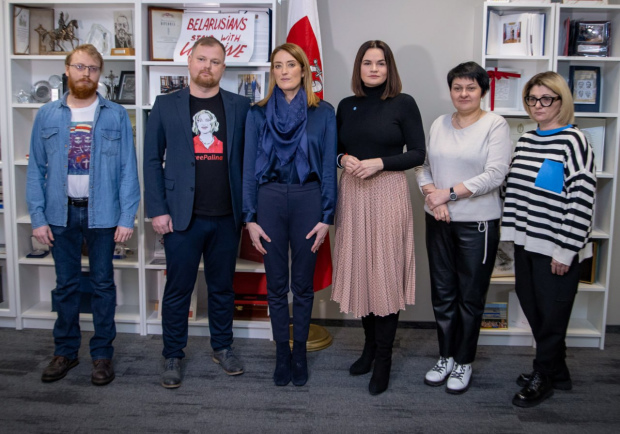At a meeting in Vilnius, former political prisoners and their families told Roberta Metsola and Svetlana Tsikhanovskaya about the struggle at the cost of their lives, and conditions in prison. Together with the head of the European Parliament and the leader of democratic Belarus, 4 people from among former political prisoners and their relatives discussed what concerns political prisoners now.
All of them took the floor. One of the interlocutors, a non-public person, remained behind the scenes. Olga Zazulinskaya, head of the "A Country to Live in" Foundation, told us what issues were raised at the meeting.
Andrei Sharenda is a former political prisoner and husband of political prisoner Palina Sharenda-Panasiuk. Andrei told Palina's story and voiced to Roberta Metsola the clear message that Palina sends to everyone: "Today I give my life for Belarus."
"That is, her struggle and resistance today come at the cost of her own life. Palina asks not to stop, not to slow down, to keep pressing Lukashenko's regime, because the political prisoners will come out only in one case - when this regime stop to exist," head of the "A Country to Live in" Foundation Olga Zazulinskaya reports the content of the conversation. - As long as the regime exists, nothing will happen".
Alena Lyskovich served time in the "roundel case". After she was released, the law enforcers continued to pressurize her, and she crossed the border with Lithuania through a forest and a river. Lyskovich talked about how difficult the situation is for people who are released.
"A political prisoner is not someone who has done time and got out," said Olga Zazulinskaya, "So he doesn't go from prison to freedom, he goes from prison to prison. These people have a travel ban, but they run away from the country because it is a forced measure. It's how they save a life."
Anatol Khinevich also served his full sentence, managed to quickly obtain a visa, and left Belarus shortly after his release. Hinevich stressed at the meeting that the strengthening of sanctions is not a tool to release political prisoners. It's a tool to prevent new sitters.
"It is clear that the regime does not go for contact, but it is in our power to identify such a subject of negotiations that will prevent arrests inside the country," says Olga Zazulinskaya. Olga Zazulinskaya herself, as the head of the foundation, which constantly works with political prisoners, reminded Sviatlana and Roberta that there are more than 1600 political prisoners in Belarusian prisons. 1400 have been released. 712 children have parents who are political prisoners. Some children have diseases and special needs. The spouse of a political prisoner could also have health problems.
"Not only political prisoners who have been released, but also family members of those who are imprisoned need rehabilitation," emphasizes Olga Zazulinskaya. - Our organization needs partners who would help in the rehabilitation of children of political prisoners. There was another subject of discussion. Some Belarusians who escaped to Lithuania have big difficulties - they fall under the suspicion of the State Security Department of Lithuania."I told the story of a Belarusian political prisoner who was on trial, whose defendants received from 11 to 25 years of imprisonment. He managed to get out under his signature on cooperation with the KGB and escape from the country. In Lithuania, the man confessed that he had signed a paper on cooperation and told the Migration Department about it. After that, he received a denial of asylum seeker status. Moreover, he received an order to be deported from Lithuania to Belarus".
There are such cases not only in Lithuania but also in Sweden, says Olga Zazulinskaya. She asked Roberta Metsola to get the European Parliament to pay attention to this problem. They also discussed the fact that the situation inside Belarus is getting worse. And if people don't go to the streets to protest, it doesn't mean that everything is fine. On the contrary, people are thrown behind bars and tortured, creating inhuman conditions for them and pressure them to sign a petition for pardon. As before, political prisoners in Belarusian prisons are marked with yellow tags.
The former political prisoners, who came to the meeting, urged the head of the European Parliament to adopt a strong sanctions package, which would force Lukashenko to release people. Besides, it was proposed to create an international fund. Its goal is to support the families of political prisoners and the rehabilitation of those who have been released.
Sviatlana Tsihanouskaya suggested Roberta Metsola to become a symbolic godmother of one of the Belarusian political prisoners. As became known later, Roberta Metsola was so impressed by the story of Pаlina Sharenda-Panasiuk that she declared her to be a symbolic goddaughter.
.jpg)
All of them took the floor. One of the interlocutors, a non-public person, remained behind the scenes. Olga Zazulinskaya, head of the "A Country to Live in" Foundation, told us what issues were raised at the meeting.
Andrei Sharenda is a former political prisoner and husband of political prisoner Palina Sharenda-Panasiuk. Andrei told Palina's story and voiced to Roberta Metsola the clear message that Palina sends to everyone: "Today I give my life for Belarus."
"That is, her struggle and resistance today come at the cost of her own life. Palina asks not to stop, not to slow down, to keep pressing Lukashenko's regime, because the political prisoners will come out only in one case - when this regime stop to exist," head of the "A Country to Live in" Foundation Olga Zazulinskaya reports the content of the conversation. - As long as the regime exists, nothing will happen".
Alena Lyskovich served time in the "roundel case". After she was released, the law enforcers continued to pressurize her, and she crossed the border with Lithuania through a forest and a river. Lyskovich talked about how difficult the situation is for people who are released.
"A political prisoner is not someone who has done time and got out," said Olga Zazulinskaya, "So he doesn't go from prison to freedom, he goes from prison to prison. These people have a travel ban, but they run away from the country because it is a forced measure. It's how they save a life."
Anatol Khinevich also served his full sentence, managed to quickly obtain a visa, and left Belarus shortly after his release. Hinevich stressed at the meeting that the strengthening of sanctions is not a tool to release political prisoners. It's a tool to prevent new sitters.
"It is clear that the regime does not go for contact, but it is in our power to identify such a subject of negotiations that will prevent arrests inside the country," says Olga Zazulinskaya. Olga Zazulinskaya herself, as the head of the foundation, which constantly works with political prisoners, reminded Sviatlana and Roberta that there are more than 1600 political prisoners in Belarusian prisons. 1400 have been released. 712 children have parents who are political prisoners. Some children have diseases and special needs. The spouse of a political prisoner could also have health problems.
"Not only political prisoners who have been released, but also family members of those who are imprisoned need rehabilitation," emphasizes Olga Zazulinskaya. - Our organization needs partners who would help in the rehabilitation of children of political prisoners. There was another subject of discussion. Some Belarusians who escaped to Lithuania have big difficulties - they fall under the suspicion of the State Security Department of Lithuania."I told the story of a Belarusian political prisoner who was on trial, whose defendants received from 11 to 25 years of imprisonment. He managed to get out under his signature on cooperation with the KGB and escape from the country. In Lithuania, the man confessed that he had signed a paper on cooperation and told the Migration Department about it. After that, he received a denial of asylum seeker status. Moreover, he received an order to be deported from Lithuania to Belarus".
There are such cases not only in Lithuania but also in Sweden, says Olga Zazulinskaya. She asked Roberta Metsola to get the European Parliament to pay attention to this problem. They also discussed the fact that the situation inside Belarus is getting worse. And if people don't go to the streets to protest, it doesn't mean that everything is fine. On the contrary, people are thrown behind bars and tortured, creating inhuman conditions for them and pressure them to sign a petition for pardon. As before, political prisoners in Belarusian prisons are marked with yellow tags.
The former political prisoners, who came to the meeting, urged the head of the European Parliament to adopt a strong sanctions package, which would force Lukashenko to release people. Besides, it was proposed to create an international fund. Its goal is to support the families of political prisoners and the rehabilitation of those who have been released.
Sviatlana Tsihanouskaya suggested Roberta Metsola to become a symbolic godmother of one of the Belarusian political prisoners. As became known later, Roberta Metsola was so impressed by the story of Pаlina Sharenda-Panasiuk that she declared her to be a symbolic goddaughter.
.jpg)


 Continue
Continue
